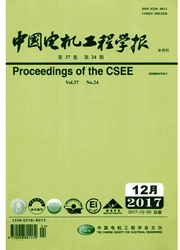

 中文摘要:
中文摘要:
智能电网的建设和电力市场的发展对短期负荷预测的精度和速度提出了更高的要求。应用一种仿生算法来改善负荷预测的精度和运算速度,提出一种基于细菌群落趋药性优化算法的最小二乘支持向量机(least squares-support vector machine based on bacterial colony chemotaxis optimization,BCC-LS-SVM)模型,通过细菌群体趋药性优化算法快速、合理地确定最小二乘支持向量机(least squares-support vectormachine,LS-SVM)的超参数。研究表明,与前馈(back-propagation,BP)神经网络算法和单纯的LS-SVM算法相比,BCC-LS-SVM算法具有较强的全局搜索能力,易于操作,能够实现更高的预测精度及更好的运算速度,更适用于当前中国短期负荷预测的需要。
 英文摘要:
英文摘要:
The development of smart grid and electricity market requires more accurate and faster short-term load forecasting.A least squares-support vector machine(LS-SVM) based on bacterial colony chemotaxis optimization(BCC) algorithm was proposed that improving the computing accuracy and speed through a novel category of bionic algorithm,and determining the hyper-parameters of LS-SVM through BCC optional algorithm fleetly and reasonably.It shows that the BCC-LS-SVM algorithm not only has strong global search capability,but also is easy to implement.A load forecast empirical example has shown that compared with back-propagation artificial neural networks and single LS-SVM algorithm,BCC-LS-SVM algorithm can achieve higher prediction accuracy,better computational speed,and which is more suitable for short term load forecasting in China.
 同期刊论文项目
同期刊论文项目
 同项目期刊论文
同项目期刊论文
 Analysis on investment decision of power generation project in electricity market considering flexib
Analysis on investment decision of power generation project in electricity market considering flexib Research on parameter design of competitive generation markets based on dynamic simulation and cloud
Research on parameter design of competitive generation markets based on dynamic simulation and cloud 期刊信息
期刊信息
